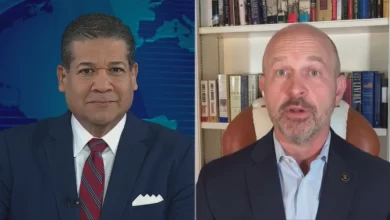Morality of Trump immigration, refugee policies sparks pitched debate

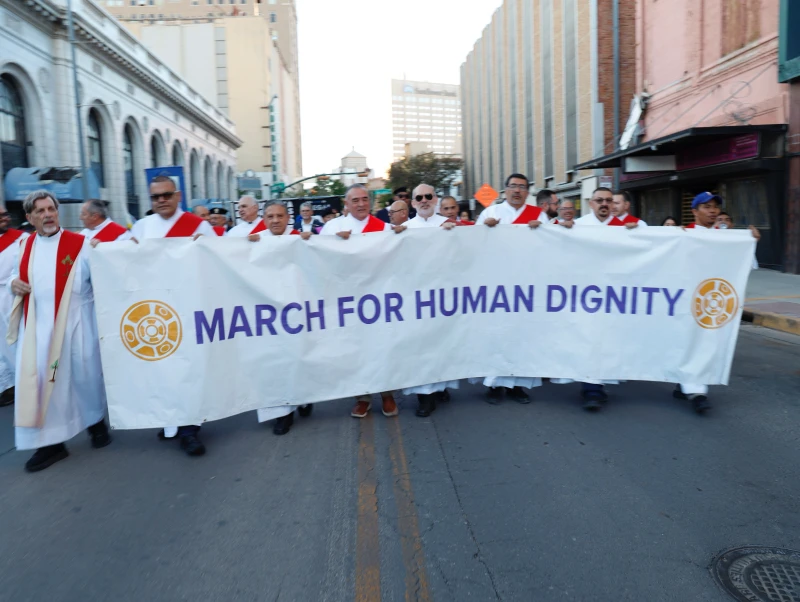 Participants march at a rally for immigrants and refugees at the Diocese of El Paso on Monday, March 24, 2025. / Credit: Father Miguel Briseño, OFM Conv
Participants march at a rally for immigrants and refugees at the Diocese of El Paso on Monday, March 24, 2025. / Credit: Father Miguel Briseño, OFM Conv Washington, D.C. Newsroom, Apr 9, 2025 / 14:37 pm (CNA).
The debate over immigration, border control, and refugee resettlement remains a hot-button topic among the general population, including U.S. Catholics, who have a wide range of stances on the issue. An array of policymakers, theologians, and representatives for Catholic aid organizations have shared their takes on the topic with CNA.
In the wake of the Trump administration’s funding cuts, Catholic aid organizations such as Catholic Charities and Jesuit Refugee Service (JRS) USA have been outspoken in their advocacy for the restoration of aid to their programs, which benefit migrants and refugees. As part of the 90-day funding freeze, over $ 18 million in federal federal funding to JRS USA was frozen, though aid to select programs has since been reauthorized. Catholic Charities across the country have shuttered refugee services and other programs due to the freeze.
At a JRS USA-sponsored conference late last month, Kevin Appleby, former director of migration policy for the U.S. Conference of Catholic Bishops and current senior director of international migration policy for the Center for Migration Studies, weighed in on the divide between the U.S. bishops and the administration.
“I always believe that dialogue is important,” he told CNA. “I don’t think the Church should wait for four years. We have to try to engage the administration as much as possible because by doing that, you can help refugees.” Appleby indicated there are areas where the Church and administration might find common ground, such as in combatting human trafficking.
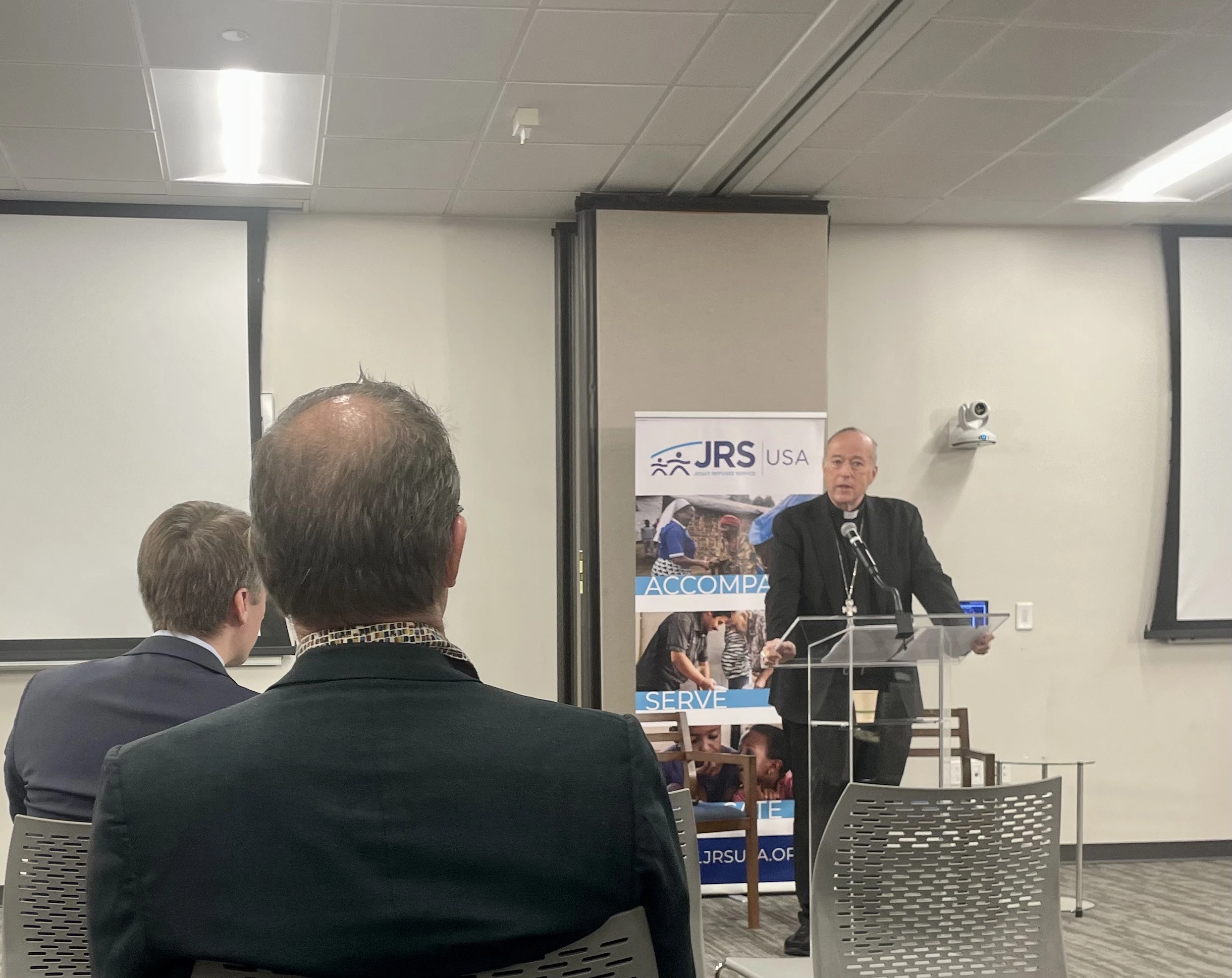
At that same conference, Washington, D.C.’s Cardinal Robert McElroy emphasized that “we’ve got to remember the call of Jesus is constant, to always be attentive to the needs and the suffering that lie around us, to perceive it, and then to act,” he said, comparing the plight of migrants to the robbers’ victim in the parable of the good Samaritan.
The cardinal archbishop criticized the Trump administration’s foreign aid suspension, describing it as “unconscionable through any prism of Catholic thought” and “moral theft from the poorest and the most desperate men, women, and children in our world today.” While acknowledging the need for border control, McElroy condemned mass deportation efforts and called for legislation that supports “generous asylum and refugee policy.”
Thomistic perspective
Both St. Augustine and St. Thomas Aquinas have also become subjects of media attention on the topic due to Vice President JD Vance’s recent invocation of the concept of “ordo amoris” in the context of the immigration debate, which then garnered a response from Pope Francis himself.
In discussing the principle, Vance, a Catholic, said “ordo amoris” teaches that one’s “compassion belongs first” to one’s family and fellow citizens “and then after that” to the rest of the world. “[Y]ou love your family, and then you love your neighbor, and then you love your community, and then you love your fellow citizens in your own country, and then after that you can focus and prioritize the rest of the world,” Vance said.
Pope Francis promptly issued a letter to the U.S. bishops in which he stated that “Christian love is not a concentric expansion of interests that little by little extend to other persons and groups.”
Offering additional insights on the subject of welcoming the stranger, the president of the Pontifical Faculty of the Immaculate Conception at the Dominican House of Studies, Father Thomas Petri, OP, noted that “obviously, Aquinas did not have the same concerns about immigration since his day was not marked by the globalism of today.”
Petri said the Angelic Doctor’s most explicit treatment of the issue comes out in his analysis of the judicial precepts found in Mosaic law. Essentially, Petri said, Aquinas “argued that foreigners who are just visiting or staying for a short period should be received without problem, [citing] Exodus 22:19 (‘Thou shalt not molest a stranger’).”
However, Petri explained, for foreigners who wanted to be admitted to citizenship, Aquinas pointed out that in those days “foreigners would not be admitted to citizenship for two or three generations.” Petri added: “The reason this was the case is instructive for us.”
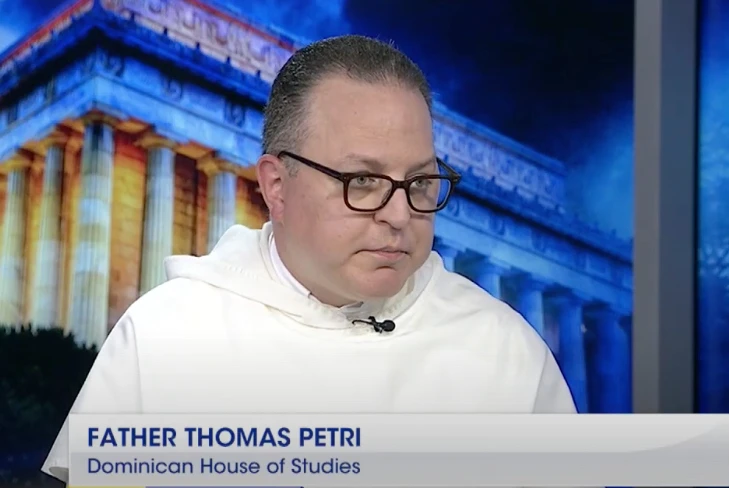
According to Petri, Aquinas believed that “those who want to be citizens need to come to understand and hold the common good of the society ‘firmly at heart’ lest they attempt to do something (even unintentionally) that might harm the society.“
Backlash against refugee resettlement
As the executive director of the Center for Immigration Studies (CIS), Mark Krikorian, sees it, the refugee system has been “so abusive of taxpayers, such a misdirection of resources” that “it may require a blunt instrument, at least at first, to address it.”
Known for its close relationship with the Trump administration, CIS bills itself as a “low-immigration, pro-immigrant” think tank. Krikorian himself is a deacon in the Orthodox Armenian Apostolic Church.
According to Krikorian, the moral debate surrounding refugee resettlement is not just the amount of money being spent or what services people should be eligible for, but over the purpose of resettlement itself.
“This public image of resettlement is that we’re saving lives, when the reality is nothing of the kind,” he said, adding: “If anything, more people die because of the money we spend on refugee resettlement than would if we spent that money on refugee protection abroad.”
“We did a deep dive into the costs of resettling a refugee here versus the cost of taking care of a refugee in the country they took their first asylum,” Krikorian continued. “The five-year cost of resettling a refugee was 12 times greater than the cost of taking care of a refugee in the country they had taken their initial refuge.”
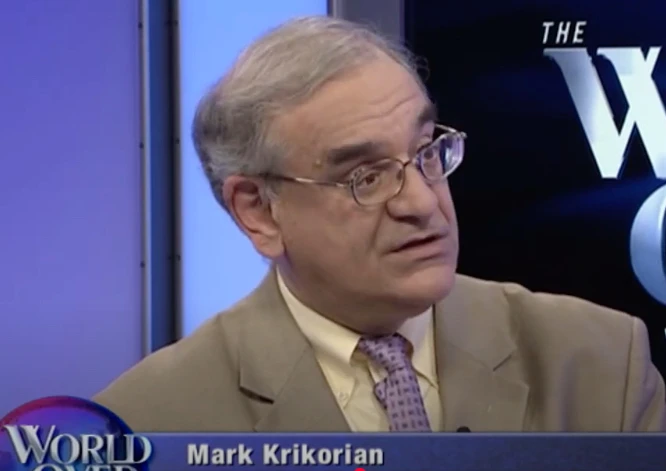
“The analogy here is that there’s 12 people floundering in the water, and instead of throwing each one of them a life preserver, which isn’t great, but at least you won’t drown, we’re sending a yacht to pick up one of them and leaving the rest to their fate,” he added. “There’s simply no excuse for it.”
While he acknowledged concerns for human dignity advanced by the U.S. bishops advocating for the restoration of the resettlement program, Krikorian also noted that “there is no infinite source of funding for refugee protection.” As such, he argued, the best use of taxpayer dollars for this purpose would be toward helping refugees abroad, “where you get much more bang for the humanitarian buck.”
A ‘longer view’
“I would advise Catholics to take a longer view of Catholic teaching, which does not support open borders or illegal migration,” Chad Pecknold, an associate professor of systematic theology at The Catholic University of America, told CNA.
“As well, I would remind faithful Catholics that the USCCB is not ‘the Catholic Church’ but a national conference which has outsourced much of the Church’s charitable work with immigrants to NGO [nongovernmetnal organization]-type organizations, many of which work on the liberal principles which have been operative in global humanitarian aid for decades,” he added. This, he said, “is at the heart of the so-called ‘debate’ between the USCCB and the administration.”
Pecknold recalled Pope Benedict XVI’s teachings in Deus Caritas Est, which stated that the Church’s charitable work “must avoid any semblance of becoming an NGO.” Benedict’s teachings were not meant to exclude the Church from becoming allied with federal programs, he said, but rather to discourage it from becoming dependent on government aid.
Notably, in the past week, the USCCB announced its decision to end its cooperative agreements with the federal government for resettling refugees and unaccompanied minors.
Multiple U.S. bishops continue to call on the Trump administration to make a radical about-face on mass deportation efforts, citing Catholic social teaching on human dignity. At a recent vigil march in solidarity with migrants in El Paso, Texas, Bishop Mark Seitz described the administration’s actions in this regard as “a fundamental attack on human community. On the body. On Jesus’ vision of a fully reconciled humanity.”
Pecknold noted that the Church has been opposed to mass deportations since the end of World War II. Yet then, as now, the Church’s position against the practice has been “under the prudential caveat that nations have the right to decide such questions.”
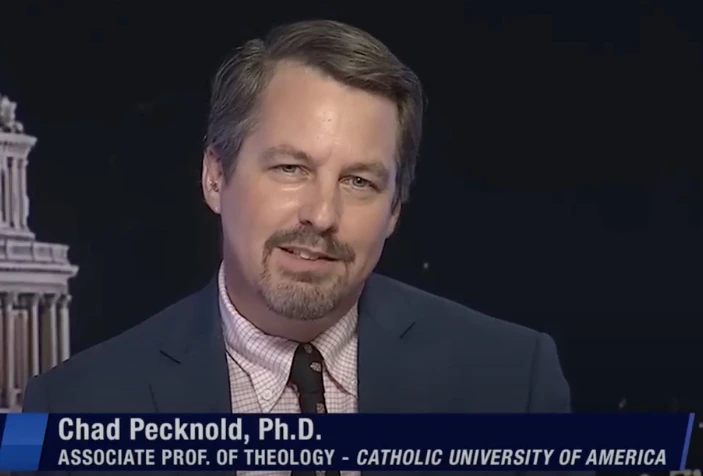
“It was never framed as ‘a fundamental attack’ on any of the emotive points the bishops insist upon,” he continued. “I think it’s good that the Church advocates always for the migrant family, for keeping the family together and safe, and when necessary and possible, for returning migrant families to the countries where they are from. But I think Bishop Seitz’s condemnations go too far.”
The CUA professor also referenced Pope Pius XII’s Excul Familia Nazarethana, the only papal encyclical on the question of migration, in which Pecknold said “the overwhelming concern was to protect the family unit.”
“Pope Pius XII encyclical on protecting migrants did not make human dignity hinge upon the absolute rights of individuals who want to cross any border they want, regardless of laws,” he explained. “Human dignity for Pius XII was bound up with the family, and the plight of migrants was keyed to both mercy and justice: Mercy for the migrant family must be balanced with the just laws of nations.”
For 2,000 years, he reflected, the Catholic Church has served as “a light” to nations on these crucial societal questions, not by acting as social activists “but by encouraging rulers to make ‘justice and mercy kiss’ as far as that is possible in their prudential decisions of civic governance.”




